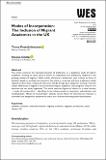Files in this item
Modes of incorporation : the inclusion of migrant academics in the UK
Item metadata
| dc.contributor.author | Pustelnikovaite, Toma | |
| dc.contributor.author | Chillas, Shiona | |
| dc.date.accessioned | 2022-09-07T11:30:13Z | |
| dc.date.available | 2022-09-07T11:30:13Z | |
| dc.date.issued | 2022-08-29 | |
| dc.identifier | 279528690 | |
| dc.identifier | 78716cba-4be9-4c6e-bc8b-258867cc3605 | |
| dc.identifier | 85137245218 | |
| dc.identifier | 000847547700001 | |
| dc.identifier.citation | Pustelnikovaite , T & Chillas , S 2022 , ' Modes of incorporation : the inclusion of migrant academics in the UK ' , Work, Employment and Society , vol. OnlineFirst . https://doi.org/10.1177/09500170221092337 | en |
| dc.identifier.issn | 0950-0170 | |
| dc.identifier.other | ORCID: /0000-0002-1184-0553/work/118800121 | |
| dc.identifier.uri | https://hdl.handle.net/10023/25961 | |
| dc.description | This work was supported by the 600th Anniversary PhD Scholarship provided by the School of Management, University of St Andrews. | en |
| dc.description.abstract | This article examines the internationalisation of professions in a qualitative study of migrant academics, drawing on social closure theory to understand how professions respond to the growing numbers of migrants. While studies of closure in professions tend to focus on forms of exclusion based on ascribed characteristics, this article is concerned with how professions include migrants in their ranks. Analysis of interviews with 62 foreign-born academics working in the UK reveals differences in degree of closure towards migrant academics, indicating that inclusion and exclusion are not binary opposites. The article captures degrees of closure in a novel concept – ‘modes of incorporation’ – identifying three inclusion patterns: integration, subordination and marginalisation. ‘Modes of incorporation’ extends closure theory by showing how inclusion is controlled and designed to preserve the status quo, thereby restricting internationalisation. | |
| dc.format.extent | 19 | |
| dc.format.extent | 169382 | |
| dc.language.iso | eng | |
| dc.relation.ispartof | Work, Employment and Society | en |
| dc.subject | Academia | en |
| dc.subject | Inclusion | en |
| dc.subject | Internationalisation | en |
| dc.subject | Social closure | en |
| dc.subject | UK | en |
| dc.subject | Migration | en |
| dc.subject | Migrant academics | en |
| dc.subject | Professions | en |
| dc.subject | LF Individual institutions (Europe) | en |
| dc.subject | JV Colonies and colonization. Emigration and immigration. International migration | en |
| dc.subject | Business, Management and Accounting(all) | en |
| dc.subject | T-NDAS | en |
| dc.subject | SDG 10 - Reduced Inequalities | en |
| dc.subject.lcc | LF | en |
| dc.subject.lcc | JV | en |
| dc.title | Modes of incorporation : the inclusion of migrant academics in the UK | en |
| dc.type | Journal article | en |
| dc.contributor.institution | University of St Andrews. Centre for the Study of Philanthropy & Public Good | en |
| dc.contributor.institution | University of St Andrews. School of Management | en |
| dc.identifier.doi | https://doi.org/10.1177/09500170221092337 | |
| dc.description.status | Peer reviewed | en |
This item appears in the following Collection(s)
Items in the St Andrews Research Repository are protected by copyright, with all rights reserved, unless otherwise indicated.

